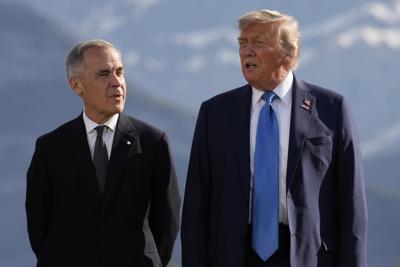U.S. President Donald Trump is threatening to hit Canadian imports with 35 per cent tariffs on Aug. 1, reviving the on-again, off-again trade war between the neighbouring countries. 
“If for any reason you decide to raise your Tariffs, then, whatever the number you choose to raise them by, will be added to the 35% that we charge,” Trump wrote in a letter to Prime Minister Mark Carney that was posted Thursday night on his Truth Social site.
In the letter, Trump says he may consider a tariff adjustment if Carney works to stop the flow of fentanyl, which the president describes as a national crisis caused in part by Canada.
Fentanyl seizures by the United States Customs and Border Patrol at the Canada-U.S. border represent less than 0.1 per cent of all U.S. fentanyl seizures between 2022 and 2024, , a position that was created in February in response to Trump’s initial tariff threats and demands.┬á
Carney responded late Thursday night saying that the government “has steadfastly defended our workers and businesses” and “will continue to do so as we work towards the revised deadline of August. 1”
“Canada has made vital progress to stop the scourge of fentanyl in North America. We are committed to continuing to work with the United States to save lives and protect communities in both our countries,” the prime minister said┬á, adding that Canadian governments are working on building trading partners with other leaders around the world.
In Trump’s letter, the American president said “the flow of Fentanyl is hardly the only challenge we have with Canada.
ÔÇťCanada charges extraordinary Tariffs to our Dairy Farmers up to 400 per cent┬áÔÇö and that is even assuming our Dairy Farmers even have access to sell their products to the people of Canada. The Trade Deficit is a major threat to our Economy, and indeed our National Security,ÔÇŁ he wrote.
But Trump says there are other issues the United States has with Canada, including supply management in the dairy sector and trade deficits.
“Instead of working with the United States, Canada retaliated with its own Tariffs,” Trump wrote.┬á
Unifor President Lana Payne called the move “extortion,” adding that Canadians have to “push back┬áÔÇö hard.”
“Canada must use every bit of leverage we have,”┬á┬á“Workers are counting on our govt to defend their jobs. Concessions wonÔÇÖt stop a bully, but collective strength will.”
Federal Conservative Leader on Trump’s latest threat of tariffs, calling it an “unjustified attack on CanadaÔÇÖs economy,” that will “damage both our countries.”
Thursday night’s announcement comes after Trump sent a flurry of letters to leaders around the world, informing them of new U.S. tariffs, which will also take effect on Aug. 1. Trump sent notices to 14 countries on Monday and said he “may send more letters in the coming days and weeks.”
Canada and the United States had committed to working on a new economic and security agreement with a July 21 deadline for the deal.
Trump slapped Canada with economywide tariffs in March but walked back duties on imports compliant under the Canada-U.S.-Mexico agreement on trade a few days later.
There are additional tariffs on steel and aluminum, auto imports and a plan to introduce sector-wide tariffs on copper, also on Aug. 1.
In a White House meeting Tuesday, Trump announced heÔÇÖd be imposing 50 per cent tariffs on imports of copper and a ÔÇťvery, very high rateÔÇŁ on pharmaceuticals.
ÔÇťToday we are doing copper,ÔÇŁ Trump told reporters at a cabinet meeting. ÔÇťI believe the tariff on copper, we are going to make it 50 per cent.ÔÇŁ
For pharmaceutical imports, the tariffs will be even higher, Trump promised.
ÔÇťWeÔÇÖre going to give people about a year, a year and a half, to come in and after that theyÔÇÖre going to be tariffed,ÔÇŁ Trump said. ÔÇťIf they have to bring the pharmaceuticals into the country ÔÇŽ theyÔÇÖre going to be tariffed at a very, very high rate, like 200 per cent. WeÔÇÖll give them a certain period of time to get their act together,ÔÇŁ he said.
Canadian exports of copper and copper-based products were valued at $9.3 billion in 2023 with just over half going to the U.S., according to Natural Resources Canada. Exports of copper ores and concentrates were valued at $3.4 billion.
Pierre Gratton, head of the Mining Association of Canada said, Trump would be giving a leg up to copper imports from a country heÔÇÖs theoretically trying to hurt the most.
ÔÇťItÔÇÖs going to hurt U.S. manufacturers, itÔÇÖs going to hurt some of our mines. But it might inadvertently be helping Chinese smelters, because the U.S really doesnÔÇÖt have any spare smelting capacity,ÔÇŁ said Gratton.
With files from Josh Rubin and The Canadian Press.

























To join the conversation set a first and last name in your user profile.
Sign in or register for free to join the Conversation